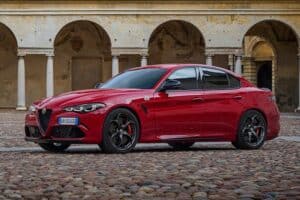Chinese marque's second generation SUV dons more a upmarket suit also seemingly inspired by that of the Ford Bronco.

Shrouded in controversy since opening its much debated plant in the Coega IDZ in Port Elizabeth, now Gqeberha, five years ago, Chinese automaker, Beijing Automotive Industrial Corporation (BAIC), has had the second generation version of its off-road-focused BJ40 leaked online.
New but still not “own” looks
Signalling a complete departure from the current that debuted in 2016, the BJ40, whose name pays homage to the Beijing BJ212, better known as the Beijing Jeep, eschews the Jeep Wrangler-inspired look for a design seemingly influenced by the Ford Bronco.
ALSO READ: Wait over: Controversial BAIC B40 Plus priced
Appearing equally similar to rival Great Wall Motors’ (GWM) Tank 300, the BJ40, which does without the “L” lettering in South Africa to avoid lured comments or comparisons, still rides on a ladder-frame chassis, but with measurements of 4 790 mm in overall length, a height of 1 895 mm, width of 1 940 mm and wheelbase of 2 760 mm.

Compared to the current model badged B40 Plus, the BJ40 is 145 mm longer, 15 mm wider, 24 mm taller and 15 mm longer on the wheelbase front. A claimed ground clearance figure wasn’t revealed.
According to carnewschina.com, citing the country’s Ministry of Industry and Information Technology, the BJ40 has a towing capacity of 2 500 kg for a braked trailer and a mechanically locking rear differential similar to the current model.
Interior transformation
Set to make its official public showing at the Chengdu Motor Show this coming Friday (25 August), the change in external design has filtered through to the interior, where the BJ40 adopts a more modern and plusher look highlighted by a digital instrument cluster and expansive touchscreen infotainment system extending almost the entire width of the dashboard.

The pair of displays separated by a single air vent, the interior also sports a rounded climate control arrangement with physical buttons, a new multi-function steering wheel, a touch-pad gear lever seemingly derived from certain Chery models and a combination of leather and Alcantara seats with orange side bolsters.
Taken in what appears to be a studio, the images, posted by AutoHome, also confirms the presence of heated and ventilated front seats, a rotary dial for the low-range transfer case with 2H, 4H and 4L, a wireless smartphone charger and a panoramic sunroof.

Similar to the Tank 300 and Bronco, access to the boot is provided by a hinged tailgate affixed to the spare wheel. As before, seating is provided solely for five.
New engine, no diesel or manual

Up front, the BJ40 takes leave of the B40 Plus’ 2.0-litre turbodiesel and Saab-made 2.0-litre turbo-petrol engines for a completely new turbo-petrol still displacing 2.0-litres, but with reported outputs of 180kW/385Nm.
The only mentioned transmission is an eight-speed automatic that replaces not only the BJ40’s six-speed but seemingly also the six-speed manual.

Not confirmed
Set to go on sale soon after its premiere in Chengdu, pricing for the BJ40 is expected to start around the 200 000 yuan (R518 507) mark with exact specification to be revealed in due course.
For now, it remains unknown as to whether BAIC South Africa will see it fit to bring the new BJ40 to market next year.
NOW READ: Controversial BAIC B40 Plus unveiled ahead of 2020 market launch
Support Local Journalism
Add The Citizen as a Preferred Source on Google and follow us on Google News to see more of our trusted reporting in Google News and Top Stories.






